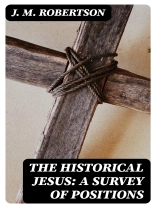In ‚The Historical Jesus: A Survey of Positions‘ by J. M. Robertson, readers are presented with a comprehensive look at the various interpretations and theories surrounding the figure of Jesus Christ from a historical perspective. Robertson meticulously analyzes the different viewpoints of scholars, theologians, and historians, providing a deep dive into the controversy and complexity of historical Jesus studies. The book is written in a clear and engaging style, making it accessible to both scholars and general readers interested in this intriguing subject. Robertson’s work situates itself within the context of early 20th-century scholarship on religious history, allowing readers to grasp the evolution of thought in this field during that time period. This scholarly exploration is a valuable resource for anyone seeking to understand the different perspectives on the historical Jesus and the debates that have shaped this area of study. J. M. Robertson’s expertise in the field of religious history lends credibility to this authoritative survey, making it a must-read for those interested in religious studies and historical research.
Über den Autor
John Mackinnon Robertson (1856-1933) was a prolific British writer, journalist, and rationalist who made significant contributions to biblical criticism and the study of Christian origins. His scholarly endeavors often centered around the questions of the historical Jesus and the validity of New Testament accounts. In ‚The Historical Jesus: A Survey of Positions‘ (1916), Robertson critically examined the diverse perspectives on the historical figure of Jesus Christ, tackling the range of scholarly opinions from outright mythicists to those asserting a more traditional historical framework. His literary style is characterized by a blend of thorough analysis, critical reflection, and a strong commitment to empirical evidence and rational thought. Robertson’s critiques were influential in early 20th-century debates on the historical Jesus and helped to lay the groundwork for future scholarly discourse on the subject. His work stood as a testament to the burgeoning skepticism of his time regarding religious dogma, and he remains a noted figure in the field of religious and historical studies for his efforts to demystify the figure of Jesus against the backdrop of the burgeoning critical scholarship of his day.












